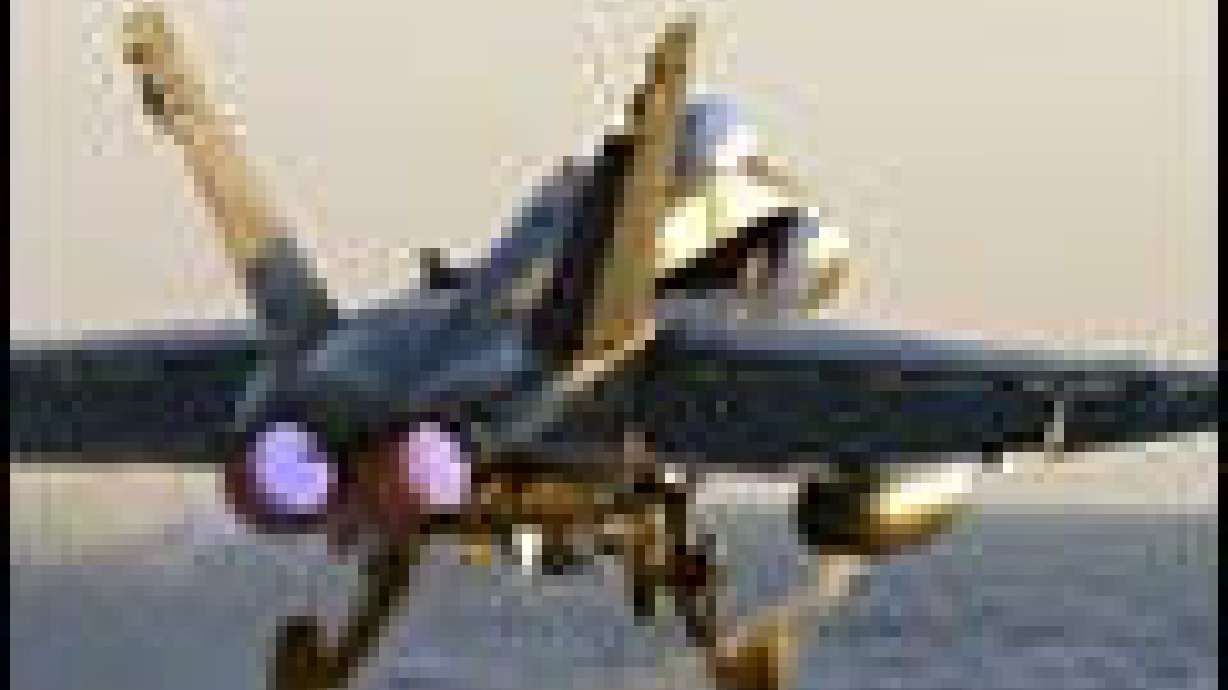Estimated read time: 3-4 minutes
This archived news story is available only for your personal, non-commercial use. Information in the story may be outdated or superseded by additional information. Reading or replaying the story in its archived form does not constitute a republication of the story.
CAMP AS SAYLIYAH, Qatar (AP) -- Coalition airstrikes pounded Iraqi positions near Syria on Thursday, as special forces troops monitored the porous frontier to prevent regime loyalists from escaping and fresh fighters from entering Iraq, U.S. officials said.
The focus on al-Qaim in far western Iraq highlights its strategic importance to Saddam Hussein's regime.
Most Iraqi surface-to-surface missiles fired during the 1991 Gulf War were launched from the area, and U.S. officials say some regime officials have already fled the country through the shortest western route out of Baghdad.
In addition, Syrian fighters have turned up on the Iraqi battlefield -- one was found hiding in a Baghdad refrigerator on Wednesday -- and other Arab fighters have crossed into Iraq via Syria to attack the U.S.-led coalition.
On Thursday, after Saddam Hussein's regime collapsed in Baghdad and the northern city of Kirkuk, it appeared some were returning the way they came: A correspondent for the al-Jazeera satellite television station at the Syrian-Iraq border said he had met Palestinian and Syrian volunteer fighters at the border who had abandoned their positions in Mosul and were returning home.
The fighters said they left the northern city after their Iraqi commanders left them alone in the streets.
Air Force Maj. Gen. Gene Renuart, operations director at U.S. Central Command, drew attention Thursday to coalition activity in the al-Qaim region, a day after Defense Secretary Donald H. Rumsfeld again accused Syria of "notably unhelpful" behavior in the war on Iraq.
Rumsfeld has accused Syria of providing Iraq with night-vision goggles and other military equipment, and said Wednesday the Damascus government had provided members of President Saddam Hussein's family and government with safe haven or passage through Syria.
Renuart said special forces were now in a position to monitor and "control" the flow of traffic into and out of Iraq through the al-Qaim crossing.
"We believe we're in a position where we can begin to control that area more freely," he said. "We continue to have some discussions with leaders in that area, and we believe we're making good progress."
But regime supporters remain, including Special Republican Guard units, paramilitary forces and some regular army forces, who are putting up sporadic but fierce resistance, said Navy Lt. Mark Kitchens, a Central Command spokesman.
"Obviously, we're running into fierce firefights, and we're going to continue to go after that," he said.
Renuart said the coalition was using airstrikes to pound the Iraqi forces, and that "we believe that those forces have been significantly reduced over the last week or two."
Coalition forces were also striking at surface-to-surface missile launching sites, since the al-Qaim area was the launch pad of most surface-to-surface missiles against Jordan, Saudi Arabia and reportedly Israel during the 1991 Gulf War.
"We clearly are interested in protecting the neighbors in that region," Renuart said. "And so, it's in our strategic interest to ensure that we preclude any capability of surface-to-surface missiles, especially those that are long range, to be launched from that area," Renuart said.
He called the strikes "preventive medicine," to ensure no missiles strike Iraq's neighbors. So far, only a few Iraqi missiles have reached Kuwait in the current conflict.
Monitoring the 310-mile Iraqi-Syrian frontier may be more difficult, however. The border is easy to cross since only areas close to official crossing points are fenced for a few miles in either direction.
Beyond the official crossing points and the Tigris River, which forms the frontier in the north, the terrain is wide open, and people cross on foot, by donkeys or four-wheel-drive vehicles.
Syrian border guards patrol in search of possible infiltrators or smugglers, who are most often sheep smugglers from Iraq into Syria, but they can't be everywhere.
Border points were open as usual on Thursday, but no Syrians or Palestinians living in Syria have been allowed to cross into Iraq for the past four days to prevent any volunteer fighters from crossing into Iraq. Only Iraqis are allowed to cross into Iraq, as well as foreigners with valid Iraqi visas.
(Copyright 2003 by The Associated Press. All Rights Reserved.)









